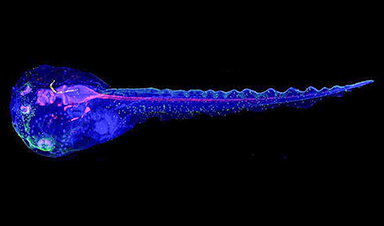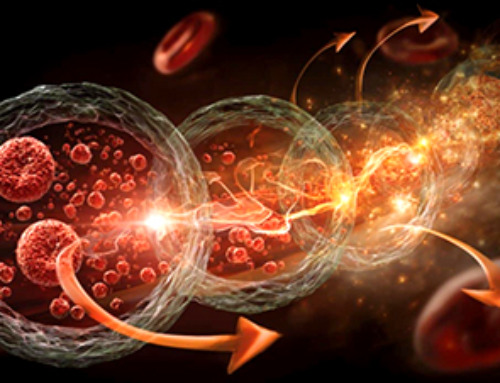Researchers from Spain and Denmark have discovered a technique for attacking cancer cells in the production of one of the origin-of-life molecules.
The molecule that gave rise to life, RNA, has been demonstrated to be important for repairing human genetic material and avoiding mutations that might lead to cancer development. Recent research breakthroughs, such as those reported by Daniel Gómez Cabello’s research team at the University of Seville, propose this compound as a therapeutic target for developing tailored cancer treatment strategies.
The RNA polymerase enzyme, the RNA production machine in cells, is required for safely and reliably repairing breaks in human DNA. RNA production is essential for healthy cells, but it is extremely important for tumor cells, which need considerably higher activity from this enzyme to grow uncontrollably.
“This study provides clues on how to improve conventional therapies and achieve a higher success rate with treatments. Although there is still a long way to go to be able to use these RNA polymerase inhibitors in the clinical setting, clinical trials are currently underway based on this enzyme for treating cancer”, explained the Principal Investigator, Daniel Gómez-Cabello.
“Increasing the knowledge on how to use these compounds in a safer and more tailored manner allows us to address as best as possible the treatment of cancer,” added the researcher Diana Aguilar-Morante, the study’s co-author.
This research by the Biomedical Institute of Seville and the University of Seville, in collaboration with the Danish Cancer Society, has been published in the prestigious journal Nature Communications. Both researchers return to Spain from Denmark and have been able to continue their research thanks to contracts funded by the Government of Andalusia and the Spanish Association against Cancer (AECC).
“Thanks to the AECC, we have been able to continue with these studies and move this project forward,” explained the author.
Currently, these researchers are working on the mechanisms of how RNA, the original molecule that enables life, can serve as a tool for treating diseases.
“Once we have observed that selectively inhibiting RNA production boosts the utility of radiation therapy in cancer cells and does not drastically affect the rest of the cells, we will start researching it in various types of cancer, such as glioblastoma and pediatric neuroblastoma,” commented Diana Aguilar-Morante. “At this point, our challenge will be to improve the efficiency of these new RNA production inhibitors and reduce the side effects that can occur in patients with cancer,” stated Gómez-Cabello.
News
AI matches doctors in mapping lung tumors for radiation therapy
In radiation therapy, precision can save lives. Oncologists must carefully map the size and location of a tumor before delivering high-dose radiation to destroy cancer cells while sparing healthy tissue. But this process, called [...]
Scientists Finally “See” Key Protein That Controls Inflammation
Researchers used advanced microscopy to uncover important protein structures. For the first time, two important protein structures in the human body are being visualized, thanks in part to cutting-edge technology at the University of [...]
AI tool detects 9 types of dementia from a single brain scan
Mayo Clinic researchers have developed a new artificial intelligence (AI) tool that helps clinicians identify brain activity patterns linked to nine types of dementia, including Alzheimer's disease, using a single, widely available scan—a transformative [...]
Is plastic packaging putting more than just food on your plate?
New research reveals that common food packaging and utensils can shed microscopic plastics into our food, prompting urgent calls for stricter testing and updated regulations to protect public health. Beyond microplastics: The analysis intentionally [...]
Aging Spreads Through the Bloodstream
Summary: New research reveals that aging isn’t just a local cellular process—it can spread throughout the body via the bloodstream. A redox-sensitive protein called ReHMGB1, secreted by senescent cells, was found to trigger aging features [...]
AI and nanomedicine find rare biomarkers for prostrate cancer and atherosclerosis
Imagine a stadium packed with 75,000 fans, all wearing green and white jerseys—except one person in a solid green shirt. Finding that person would be tough. That's how hard it is for scientists to [...]
Are Pesticides Breeding the Next Pandemic? Experts Warn of Fungal Superbugs
Fungicides used in agriculture have been linked to an increase in resistance to antifungal drugs in both humans and animals. Fungal infections are on the rise, and two UC Davis infectious disease experts, Dr. George Thompson [...]
Scientists Crack the 500-Million-Year-Old Code That Controls Your Immune System
A collaborative team from Penn Medicine and Penn Engineering has uncovered the mathematical principles behind a 500-million-year-old protein network that determines whether foreign materials are recognized as friend or foe. How does your body [...]
Team discovers how tiny parts of cells stay organized, new insights for blocking cancer growth
A team of international researchers led by scientists at City of Hope provides the most thorough account yet of an elusive target for cancer treatment. Published in Science Advances, the study suggests a complex signaling [...]
Nanomaterials in Ophthalmology: A Review
Eye diseases are becoming more common. In 2020, over 250 million people had mild vision problems, and 295 million experienced moderate to severe ocular conditions. In response, researchers are turning to nanotechnology and nanomaterials—tools that are transforming [...]
Natural Plant Extract Removes up to 90% of Microplastics From Water
Researchers found that natural polymers derived from okra and fenugreek are highly effective at removing microplastics from water. The same sticky substances that make okra slimy and give fenugreek its gel-like texture could help [...]
Instant coffee may damage your eyes, genetic study finds
A new genetic study shows that just one extra cup of instant coffee a day could significantly increase your risk of developing dry AMD, shedding fresh light on how our daily beverage choices may [...]
Nanoneedle patch offers painless alternative to traditional cancer biopsies
A patch containing tens of millions of microscopic nanoneedles could soon replace traditional biopsies, scientists have found. The patch offers a painless and less invasive alternative for millions of patients worldwide who undergo biopsies [...]
Small antibodies provide broad protection against SARS coronaviruses
Scientists have discovered a unique class of small antibodies that are strongly protective against a wide range of SARS coronaviruses, including SARS-CoV-1 and numerous early and recent SARS-CoV-2 variants. The unique antibodies target an [...]
Controlling This One Molecule Could Halt Alzheimer’s in Its Tracks
New research identifies the immune molecule STING as a driver of brain damage in Alzheimer’s. A new approach to Alzheimer’s disease has led to an exciting discovery that could help stop the devastating cognitive decline [...]
Cyborg tadpoles are helping us learn how brain development starts
How does our brain, which is capable of generating complex thoughts, actions and even self-reflection, grow out of essentially nothing? An experiment in tadpoles, in which an electronic implant was incorporated into a precursor [...]





















